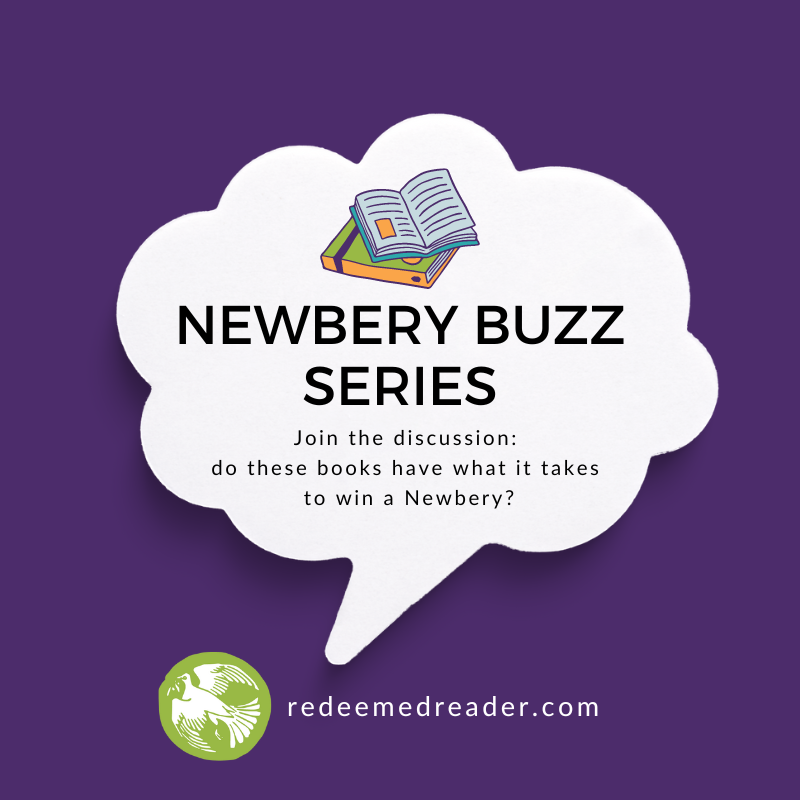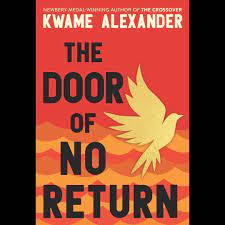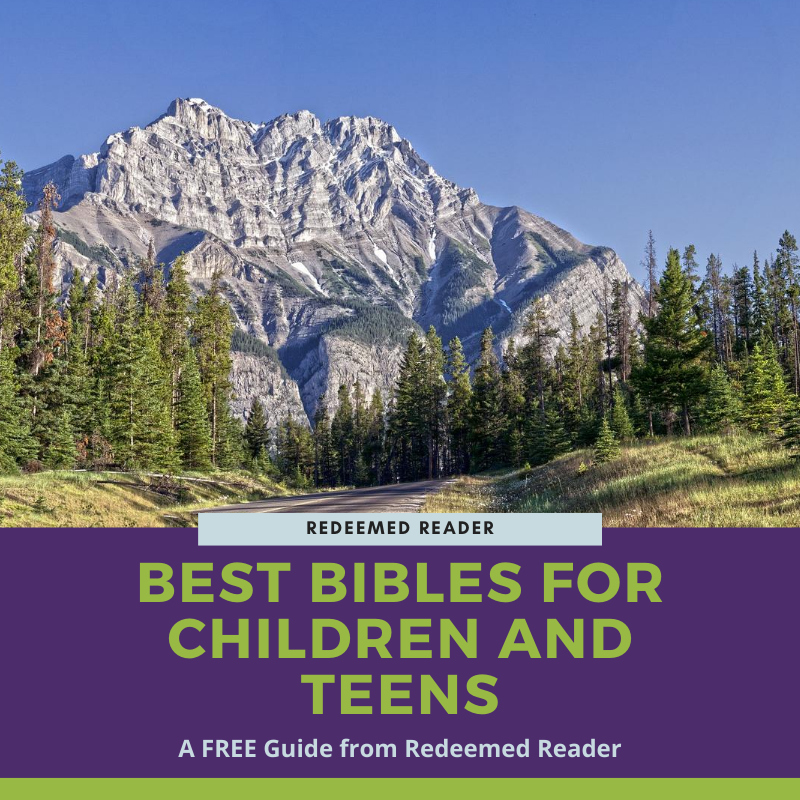Back for our second buzz, Janie and Betsy talk over a troubling but moving verse novel.


Out of Africa
Janie: Kwame Alexander scored a gold medal in 2015 with The Crossover, a verse novel about a tight-knit black family. We liked The Crossover a lot (see our review). Alexander’s latest verse novel is generating a lot of speculation that this may be his year again. The Door of No Return has appeared on almost every “Best of” list there is and I gave it high (though qualified) praise in my Redeemed Reader review. Before we talk about it,here’s the synopsis:
Kofi, the protagonist, enjoys the love of his family and basks in the reflected glory of his brother Kwasi, a champion wrestler. He knows little of the world outside his Asanti village except through the local schoolmaster, who was educated in a mission school and wants all his students to share his admiration of western culture. But tensions with Asanti clans upriver lead to a tragic accident blamed on Kwasi, which leads in turn to a campaign of revenge, leading finally to Kofi’s capture and sale to white slave traders.
Kwame Alexander admits in the author note that this was a hard story to write, and it’s a hard story to read, especially toward the end. But is it a necessary read? The last five years have seen several slave-related novels published. Betsy, what sets this one apart for you?
Betsy: Janie, I thought The Door of No Return was a great read, but you’re right: that second half is a tough read emotionally. In a sea of narratives unpacking enslaved people’s experiences, The Door of No Return offers the narrative of a particular boy’s experience from a particular tribe in a particular time and place. Rather than simply pitting one entire race against another, Alexander shows us individuals or small groups demonstrating virtue or vice. I thought it raised some good questions about the slave trade, and I thought Alexander’s verse was especially well-suited to this story. What about you? Do you think the verse format helps or hinders the story?


Janie: I’ve read some verse novels that made me wonder what was the advantage. But I think Alexander is one author who understands how to use the power of verse in fiction. The Door of No Return is told in present tense, which puts us into Kofi’s experience as an ordinary boy growing up in a time and place that would be alien to most American readers. There’s an immediacy to verse, a kind of stream-of-consciousness narration that allows us to connect emotionally in ways we might not with prose. It’s not as easy as it looks, but I think Alexander is becoming a master of the craft.
Western Culture–Good or Bad? Or is the question that simple?
Janie: You mentioned that the story demonstrates some nuance in its portrayal of Africans and the slave trade. Alexander shows that some Africans were involved in the trade, and even profited by it, which is historically true. What did you think of the portrayal of whites? Not just individual white people, but western culture itself?
Betsy: That’s a conundrum, Janie! On the one hand, I thought it interesting that Kofi was interested in Shakespeare. We still read—and enjoy—Shakespeare because he presented human nature so accurately: the stories might be set in different times and places from our own, but we can recognize ourselves (and others) in his characters. So, it makes sense to me that Kofi might respond similarly. But his teacher’s insistence on the Queen’s English was jarring. That was certainly the standard operating procedure back then, but today, it sounds ludicrous. Particularly since the teacher was not white himself, and the children were in an African country. It abruptly demonstrates to the reader just how far the push to bring European culture to Africa went.
The slave trade was an abomination, no matter who participated (Africans or Europeans/Americans). Alexander unflinchingly portrays the evils involved, both in the holding cells/area as well as on board ship. I appreciated his delicate touch in handling the especially gut-wrenching parts (such as the treatment of the African women and girls). I’m on the fence as to whether I wish he’d included at least one positive white character or not; certainly, a young many such as Kofi in that time and place may never have encountered a white person who wasn’t involved in the slave trade. It is also true that not all whites were involved, whether Kofi would have encountered them or not. What about you? What did you think of this part of the story?
Janie. It’s unlikely that Kofi would have encountered a sympathetic white person under the circumstances. We might assume that whites at the missionary school Mr. Goodluck Kwaku Phillip attended were sympathetic, else the teacher might not have returned with such a favorable impression of the Queen’s English. Kofi’s appreciation for Shakespeare might be a nod to the good in white culture, a tribute the whites do not reciprocate. I think this is something white readers need to understand. Western culture was stronger in many ways, and bound to prevail, but could have done so by accommodating, not dominating.
Betsy: I love your point at the end there–that Western culture could have prevailed by accommodating, not dominating.
Janie: So, one more question: what do you think the novel’s chances are for Newbery gold?
Betsy: I think there’s definite potential. Kwame is a well-known author with good reason: he consistently delivers. He leverages his verse style well in this novel; he’s tackling a trendy/hot topic (racism and black/white historical tension) in a fresh, unique way; both make the book “distinctive.” I’d be pleased if it won, even if it wasn’t my favorite read of the year. This book manages to handle some heavy topics and themes in a middle-school friendly way, and I think it will be engaging to young readers. In recent years, the Newbery attention seemed to skew towards edgier (more mature) titles and/or books that young readers might not actually want to read. What do you think?
Janie: Yes, and yes, for all the reasons you mention. We’ll find out soon enough. In the meantime, reader, check back on Wednesday when we mull over the chances for Gary Paulsen’s posthumous novel, Northwind.
Stay Up to Date!
Get the information you need to make wise choices about books for your children and teens.
Our weekly newsletter includes our latest reviews, related links from around the web, a featured book list, book trivia, and more. We never sell your information. You may unsubscribe at any time.
Support our writers and help keep Redeemed Reader ad-free by joining the Redeemed Reader Fellowship.
Stay Up to Date!
Get the information you need to make wise choices about books for your children and teens.
Our weekly newsletter includes our latest reviews, related links from around the web, a featured book list, book trivia, and more. We never sell your information. You may unsubscribe at any time.
FREE Bible Guide!
Get a guide to the Best Bibles for Children and Teens. Perfect for an Easter gift.
We'd love to hear from you!
Our comments are now limited to our members (both Silver and Golden Key). Members, you just need to log in with your normal log-in credentials!
Not a member yet? You can join the Silver Key ($2.99/month) for a free 2-week trial. Cancel at any time. Find out more about membership here.
2 Comments
Leave a Comment
You must be logged in to post a comment.


What age level? It was recently donated to my K-5 public school.
Lou,
There’s some pretty tough material, such as suggested (not shown) rape and suicide. I think fifth grade is much too young; would recommend instead for middle school and up.